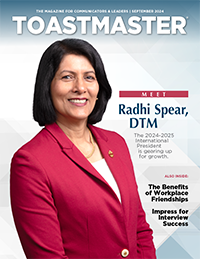
Authenticity is vital in effective business communications to establish critical trust and relatability. But with so many strategic decisions to make during a presentation, and many colleagues reviewing or contributing to it, how can leaders ensure they’re communicating authentically?
Here are five tactics to ensure you’re being the true you when sharing your ideas.
1 Don’t Say Things That Don’t Sound Like You
Let’s start with what makes a leader sound inauthentic. At the top of the list: words and phrases that don’t match the leader’s speaking style or vocabulary. Whether they write their own speeches or not, leaders should reject wording that sounds more like a press release or poet laureate than themselves.
A phrase that reads authentic may not actually sound authentic when spoken aloud. Use the “Read Aloud” feature under the Review tab in many versions of Microsoft Word (or another text-to-speech program) to hear what your written text sounds like when spoken.
As a speechwriter, I once proudly turned in a manuscript that included a very fresh and creative phrase. I thought I nailed it. But the client crossed it out and wrote, “I’m not this clever.” He was right; I was wrong. In authentic expression, personal always comes before poetic.
2 Skip the Script
If you want to create an authentic connection with your team, the last thing you want to do is write a speech and read it to them word-for-word. Reading turns a presentation into a performance: focusing on a script and words versus your audience and your points. If you’re hyperfocused on giving a “perfect speech” and think having a script is the best way to achieve that, remember that you’re not in a public speaking competition. Your job is to engage and inspire, not impress. And in the speaker’s job, spontaneity and authenticity eat precision for breakfast.
Instead, create limited notes that focus on your outline and details you might otherwise forget. Keep it tight—like a cheat sheet—because to maintain authenticity, your notes should support you, not script you.
3 Tell Stories
Authenticity is conveyed particularly well through personal stories and examples. These short narratives don’t need to be monumental events in your life. Even minor details—like a hobby, a pet, or a funny parenting moment—can humanize a leader as effectively as a life-changing incident. Because they are so relatable, stories are also more effective icebreakers than simple jokes.
True stories are compelling because you’re using “I” and “my,” which are authenticity superconductors. In fact, any executive statement can sound more authentic merely by starting with the words “I believe that.”
Use “I” only when relatability and trust are critical values, such as in stories and personal declarations. Most other leadership communications should begin with “we” to reinforce that success hinges on the entire team, not on the leader alone.
4 Be Unafraid to Make Mistakes
Another authenticity superconductor is imperfection. To err is indeed human! This doesn’t mean you should intentionally make mistakes, just forgive yourself if you do and know it can make you seem more human. And keep in mind that many people may not even be aware that you made a mistake.
Some speakers hyperfocus on perfection, overestimating how much their colleagues or audience cares about a forgotten detail or a word fumble—or even a shirt stain, bad hair day, or a sudden cough. Psychologists call this hypersensitivity to perceived personal errors “the spotlight effect,” and warn it can lead to crippling anxiety or excessive apologizing, which erodes your credibility.
When you make a mistake, remember that the authenticity points you gain are more valuable than the perfection points you lose. If you make an error, don’t apologize, which calls attention to the error. Quickly correct yourself and move on.
5 Be Mindful With Your Truth
Being authentic doesn’t mean revealing everything there is to know about you. Make revelations purposeful, not just personal, and don’t share opinions or details you wouldn’t want to be repeated to your entire staff or shared with local news media.
Authenticity is a leadership virtue but remember that it’s exhibited as much by your communication as by your behavior. Conveying authenticity through conscientious messaging builds the levels of trust and respect that are essential to successful leadership and inspiration.
Joel Schwartzberg is the senior director of strategic and executive communications for a U.S. national nonprofit; a presentation coach; and author of The Language of Leadership: How to Engage and Inspire Your Team and Get to the Point! Sharpen Your Message and Make Your Words Matter. Follow him on X @TheJoelTruth.




